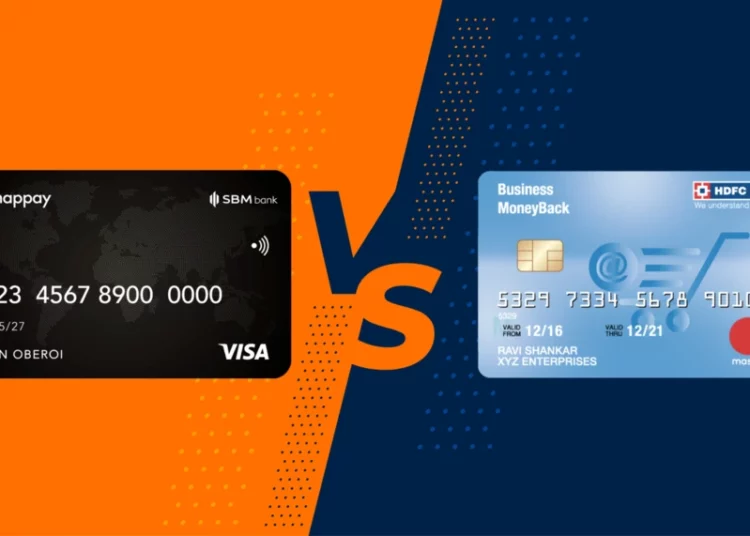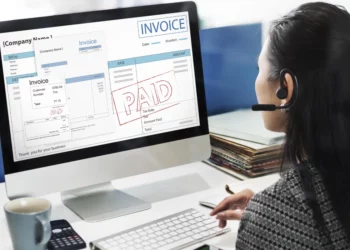Business credit card vs Corporate credit card
A dependable financial management system is a must-have for your business to ensure its success. One crucial component of such a system is choosing the most suitable credit card to meet your business needs.
Although business and corporate credit cards may appear interchangeable, critical distinctions exist. These differences can significantly affect your financial strategy.
This guide explores the key differences between business and corporate credit cards, guiding you towards the best option for your organization. Additionally, we will provide you with an in-depth understanding of the benefits and limitations of each card type to enable you to make informed decisions.

What is a business credit card?
A business credit card is a handy financial tool for business owners. It works like a personal credit card, but the cardholder is a business entity rather than an individual. Business credit cards allow businesses to make purchases and pay bills for business expenditures. They also offer benefits like reward points, cashback, and travel perks.
Most business credit cards have features that cater to the needs of businesses. These include expense tracking tools, employee card management, and the ability to set spending limits. Business credit cards also offer credit lines typically higher than personal credit cards, which helps businesses manage cash flow and make larger purchases.
What is a corporate credit card?
A corporate credit card is a payment card issued to employees of an organization for business-related expenses. Unlike business credit cards, corporate credit cards have higher credit limits to accommodate larger business expenses. Additionally, corporate credit cards have automated expense tracking and custom spending limits to help companies monitor and control employee spending.
To qualify for a corporate credit card, businesses typically need higher annual revenues and must satisfy more stringent eligibility criteria than regular business credit cards. Corporate credit cards are ideal for larger businesses with significant spending needs, providing many benefits that can help streamline expense management and optimize cash flow.
Suggested Read: 5 Best Corporate Credit Cards in India
Differences between business credit cards and corporate credit cards
Let’s understand the differences between the two through a set of parameters.
|
Business credit card |
Corporate credit card |
|
|---|---|---|
|
Eligibility criteria |
Available to businesses of all sizes, including self-employed professionals, sole proprietors, and big and small-sized businesses |
Only large businesses and corporations qualify with annual revenue of around INR 40,00,000 to 33,00,00,000 (indicative) or more. |
|
Threshold requirements |
Revenue, employee count, and spending history are not essential |
Corporations must meet the revenue, employee count, and spending criteria to qualify |
|
Expense tracking and reporting |
May not be available on all cards |
There are several advanced features, like insurance benefits, spend control, real-time spend visibility, and integration with finance apps, besides these for comprehensive administration |
|
Individual liability |
Business owner is responsible for the debt |
Some corporate credit cards may require a security deposit. |
|
Financial liability |
Only the business owner remains subjected to credit checks, limit will be allocated based on the credit history of business owner |
Balance sheet, PnL statements and other relevant financials statements of corporates are checked before allocating credit line |
|
Use cases |
Business purchases, managing cash flow, building credit, managing employee spending, emergency expenses |
Travel expenses, purchasing supplies, client entertainment, cash flow management, expense tracking and reporting, emergency expenses |
Who should use business credit cards?
Business credit cards are helpful for businesses of all sizes and structures, including sole proprietors, LLCs, and gig workers (independent contractors and freelancers).
For example, an organization’s sales team that frequently travels to attend client meetings and industry events can get a convenient way to pay while on the go with a business credit card. A business credit card helps manage expenses, build credit, and earn rewards.
Small business owners with limited resources can benefit from credit lines, which are typically higher than personal credit cards. It ensures a steady cash flow and allows making necessary purchases to grow a business. However, organizations must use them responsibly and pay on time to avoid accumulating debt and harming their business credit scores.
Who should use corporate credit cards?
Corporate credit cards benefit organizations that process several transactions and have multiple employees authorized to spend on behalf of the company. Key employees, like the ones from procurement, who frequently make purchases on behalf of the company, are best suited to use corporate credit cards.
For example, a large corporation with several departments and numerous employees who frequently travel for business reasons can use a corporate credit card.
They can get improved financial reporting, higher credit limits than personal credit cards, and automated expense tracking. Moreover, corporate credit cards allow companies to identify spending patterns and trends and make informed decisions about future purchases.
Also, Read: How to Increase the Corporate Credit Card Limit?
Features of business credit cards
Here are some vital features of business credit cards.
1. Travel benefits
Many business credit cards offer travel benefits like travel insurance and access to airport lounges. These benefits can help businesses save money on travel expenses and provide a better experience for employees.
2. Expense management tools
Business credit cards often come with expense management tools that make it easy to track and categorize expenses, generate reports, and monitor employee spending.
3. Fraud protection
Business credit cards typically have robust fraud protection features like real-time alerts, zero liability protection, and dispute resolution services.
4. Business-specific perks
Some business credit cards may offer perks specifically designed for businesses. These include discounts on office supplies, travel, or other business-related expenses.
5. Cash flow management
Business credit cards can help businesses manage their cash flow by providing a revolving credit line that covers expenses as they arise. This can be particularly useful for businesses that experience seasonal fluctuations in revenue.
Features of corporate credit cards
Here are some key features of corporate credit cards.
1. Customizable spending controls
Corporate organizations can set customized spending controls for individual employees and teams. It helps prevent overspending and ensures expenses align with the company’s priorities.
2. Centralized billing
All employee charges are consolidated into a single statement. It thus becomes easier to track expenses, manage cash flow, and reconcile accounts.
3. Robust reporting and analytics
Detailed reporting and analytics allow businesses to track expenses and monitor spending trends to fine-tune future purchases.
4. Integration with expense management software
Corporate credit cards can integrate with popular expense management software, making it easy to automate expense reporting, track spending, and generate customized reports.
5. Rewards programs
Corporate credit cards often come with incentives like cashback. These rewards can offset expenses, fund future purchases, or provide incentives to employees.
Quick Read: Top 10 Corporate Credit Card Benefits for Every Business
Benefits of business credit cards
Here are some of the top benefits of using a business credit card.
1. Build company credit
Using a business credit card responsibly can help your company establish and build its credit profile, which can be beneficial when applying for loans in the future.
2. Boost cash flow
Business credit cards provide a revolving line of credit that covers expenses and manages cash flow. It helps businesses that often experience fluctuations in revenue.
3. Segregated business expenses
A business credit card helps keep business and personal expenses separate, making tracking and managing finances easier.
4. Rewards
Many business credit cards offer rewards programs that include points, cashback, or other perks.
5. Track spending
Business credit cards offer robust expense management tools that enable seamless expense tracking, purchase categorization, and report generation.
Benefits of corporate credit cards
Here are the top benefits of using a corporate credit card.
1. Spend controls
Corporate credit cards allow businesses to set customized spending controls and restrictions for cardholders. It prevents overspending when the spending limit is reached.
2. Budget tracking
Corporate credit cards offer budget-tracking tools that make it easy to monitor expenses and spending trends and identify areas for cost savings.
3. Real-time spend visibility
Corporate credit cards enable real-time visibility into spending, which can help prevent fraud, identify anomalies, enable seamless reconciliation, and save audit hassles.
4. Online payments
Many corporate credit cards offer seamless online payment capabilities, which help businesses streamline their payment processes and reduce administrative overhead.
5. Integration with third-party apps
Corporate credit cards can integrate with many popular finance apps. It helps businesses automate expense management, track spending, and generate customized reports.
Suggested Read: 10 Best Prepaid Travel Cards for India
What is the eligibility for a corporate credit card?
The eligibility criteria may vary with each service provider, but here are some general requirements for an organization to qualify for a corporate credit card.
1. Existing Business Entity with Audited Financial Statements
To be eligible for a corporate credit card, the business must be an existing entity with audited financial statements. Credit card issuers must ensure the business has a financial history and can manage its finances responsibly.
2. Annual revenue
A corporate credit card issuer typically requires a minimum annual revenue to consider the business for a credit card. It ensures the business has a consistent income to manage its expenses.
3. Positive credit report
Businesses with negative information on their credit reports, such as late payments, defaults, or bankruptcies, may not be eligible for a corporate credit card. Credit card issuers check the business’s credit history to assess its creditworthiness.
4. Clean image
A borrower on the defaulters’ list, such as a blacklist maintained by a credit bureau, may not be eligible for a corporate credit card. Credit card issuers will check the borrower’s name against such lists to determine if they have a history of defaulting on loans.
What is the liability of a corporate credit card?
Generally, the organization issuing the corporate credit card is responsible for charges made on it by its employees. In some cases, organizations can require their employees to sign a personal liability agreement, making them responsible for card charges unrelated to business expenses or violating company policy.
Organizations must have clear policies and guidelines around the use of corporate credit cards to ensure employees understand their responsibilities for using the card.
Additionally, organizations should regularly monitor their corporate credit card accounts and review transaction reports to identify any unauthorized charges and take appropriate action.
Also, Read: The Definitive Guide to Corporate Credit Card Policy
What is the eligibility for a business credit card?
Unlike traditional business loans or lines of credit, business credit cards usually do not have a minimum annual revenue or the number of employee requirements.
This makes them an attractive option for businesses of all sizes, from startups to established enterprises. Additionally, no minimum spending threshold is typically required to qualify for a business credit card.
However, credit card companies may consider the following factors when evaluating a business credit card application.
1. Owner’s personal credit score
Lenders typically check the owner’s credit score, indicating the owner’s ability to manage personal finances and make payments on time. Generally, a higher credit score is better, as it shows that the owner is less risky to lend to.
2. Tenure of business
Some lenders may require that a business is in operation for at least one year before it can apply for a credit card. A longer history of operations demonstrates the stability of the business and its ability to generate revenue.
3. Financial history
Lenders may look at a business’s financial history, including its revenue, expenses, and cash flow, to assess its ability to make payments on a credit card. A business with a steady revenue and positive cash flow history may be less risky to be approved for a credit card.
What is the liability for a business credit card?
Here are some liabilities business owners need to consider when applying for a credit card.
1. Personal guarantee
It is a legally binding agreement that gives the credit card issuer the right to pursue the business owner’s personal assets if the business cannot pay its debts. Personal assets like a home or car may be at risk.
2. Credit check
Lenders perform credit checks only on the business owner and not other authorized members.
3. Debt liability
Even if multiple employees or authorized users can access the credit card and make purchases, the business owner is ultimately responsible for paying the balance.
Suggested Read: What is Corporate Credit Card Reconciliation?
Which card is suitable for your business: a business credit card or a corporate credit card?
Here are some factors to consider when deciding which card suits your business.
1. Company size
Business credit cards are typically designed for small to medium-sized businesses, while corporate credit cards are better suited for larger corporations with more significant financial needs.
2. Business type
The type of business you operate will decide between a business credit card and a corporate credit card. For example, a business credit card may be more appropriate for a small startup, while a corporate credit card may better suit a multinational corporation.
3. Employee count
A corporate credit card may be the better option if many employees require access to a company credit card. Corporate credit cards can provide more extensive spending limits and transaction capabilities to accommodate the needs of a larger workforce.
4. Transaction limit
Business credit cards often have lower transaction limits than corporate credit cards. A corporate credit card may be more appropriate if your business needs to make large purchases or engage in significant transactions regularly.
Also, Read: 5 Best RazorpayX Alternatives for Corporate Card
Happay EPIC Card
1. Collateral-free credit with higher limits: Happay EPIC card card makes it easier for businesses to access the capital to grow and expand without worrying about collateral.
2. Comprehensive controls: It helps businesses optimize their spending and improve visibility into their finances. Businesses can set spending limits for individual cardholders, track real-time transactions, and receive alerts and notifications for every purchase.
3. Cashback: The cashback feature of Happay EPIC Card allows users to enjoy the convenience of receiving direct cashback instead of other rewards. It becomes easy to use this tangible reward for future transactions.
4. Budget Tracking: The card has extensive expense management features, including assigning a project, individual, or team budget. This makes it easy for organizations to understand spending and stay on budget.
5. Online payments: Businesses can make online payments easily and securely, saving time and reducing the need for manual payment processing.
6. Integration with finance apps: The card integrates with popular finance apps, making it easy to streamline financial management and accounting processes.

Bottom line
Business and corporate credit cards differ based on the type of business they are best suited for, the transaction and spending limits, and the rewards they offer. Business credit cards are for small to medium-sized businesses with lower transaction and spending limits than corporate credit cards.
On the other hand, corporate credit cards are better suited for larger corporations with more significant financial needs, offering higher transaction and spending limits, comprehensive controls, and flexible reward options.
Ultimately, the decision between a business credit card and a corporate credit card will depend on the specific needs of your business. Careful consideration of these factors can help you make an informed decision and select the card best suited for your business’s financial needs.

FAQs
Corporate credit cards offer the following benefits:
a) Higher spending limits
b) Comprehensive controls
c) Simplified expense tracking
d) Rewards programs
e) Improved cash flow
Corporate credit cards are intended only for business-related expenses. Using a corporate credit card for personal use can lead to issues with compliance and violate company policy, resulting in disciplinary action or even termination in some cases.
The annual fee for corporate credit cards can vary depending on the issuer, the type of card, and the level of benefits and rewards offered. However, some cards, like Happay EPIC Card, do not have any fees, making it a convenient option. Other cards may have higher annual fees with more comprehensive rewards.
Many corporate credit cards are available in the market, and the best one for your business will depend on your specific needs and requirements. However, Happay EPIC Card is one of India’s best corporate credit cards. It offers a range of features and benefits that make it a popular choice for businesses.
Yes, a corporate credit card can affect the CIBIL score of the company. However, the impact on the CIBIL score may differ depending on the specific circumstances.







